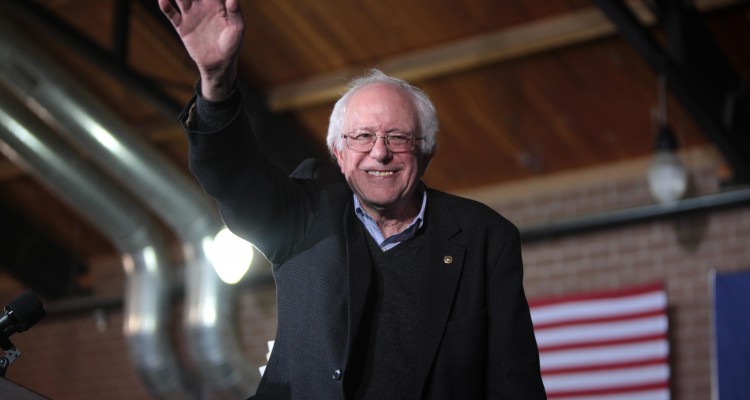
This week’s Vine cover.
In 1991, the subversive Californian political rock group, Rage Against the Machine, took no prisoners as they spewed the lyrics, “We need a movement with a quickness / You are the witness of change / And to counteract / We gotta take the power back.” Though radicalism through music has been intrinsically rooted in the American spirit since the Negro Spiritual movement of the 19th century, the political sphere always seems to find a way to reinvent itself through the expression of music.
Present-day Vermont senator Bernie Sanders is revitalizing his campaign approach through the means of affiliative musicality in order to ascertain the millennial demographic in his road to the 2016 presidential election. While enlisting the help of the likes of Jackson Browne, Jeff Tweedy of Wilco and Killer Mike of Run the Jewels, Sanders has narrowed the marginal sector of millennial voter turnout for his campaign to “start the political revolution.”
Look to none other than the Iowa caucus on Feb. 1, in which Sanders joined Vampire Weekend and the Dirty Projectors in a spirited rally just before the caucus the following day. While Sanders lost to Democratic nominee Hillary Clinton by a total of four electoral votes, the situation proved something — the power of the millennial vote is growing and music is bridging the gap between Sanders’ campaign and the influence of music, specifically indie rock.
Sanders is no stranger to music, surprisingly. In 1987, Sanders released a spoken-word folk album entitled “We Shall Overcome,” taking a page from Pete Seeger and featuring over 30 different musicians from his state of Vermont, which included the likes of Andy Shapiro and Kathy Carbone. Sanders, who is now 74, is continuing the efficacy of political musicality in his 2016 presidential campaign, which led to a 70-point advantage over Clinton in the Iowa caucus in the 30 and below age group.
The Brooklyn native has even been endorsed by means of concerts such as the “Feel the Bern” concert in Los Angeles on Feb. 5. The event was headlined by funk rock icons Red Hot Chili Peppers and aimed to provide endorsement and funds to Sanders’ campaign. Flea, bassist for RHCP, stated, “Every other politician greedily grabs every cent they can get from any scumbag lobbyist. This is a man with integrity.”
Another benefit concert that occurred called “Sanders Commit To Vote Concert” drew up support for the New Hampshire primary on Feb. 9, which included Edwards Sharpe and the Magnetic Zeroes, Jon Fishman of Phish and Matt Nathanson. In turn, Sanders experienced a huge victory in the democratic state, winning over Clinton by 32 percent and beating out Republican nominee Donald Trump by 50,000 votes. Fishman stated afterwards that “I moved to Burlington the year he became mayor. He was an incredible guy then, and everything he has stood for, he’s stood for the entire time. He’s consistent.”
Unfortunately for Sanders, he has ways to go before catching up to Clinton with the Generation X turnout, where according to the Pew research center, only 41 percent of registered democrat voters between ages 36 and 51 would vote for Sanders. Sanders, whose platform aligns with democratic and socialist ideologies, aims to nationalize healthcare and free public university tuition, as well as tax equality for the upper class, which has caused much debate over the amount of funds necessary to drive his presidency. Still, Sanders has lost two of three primaries to Clinton, the most recent being South Carolina by 25 percent.
The appeal for Sanders over Clinton by millennials, however, is that independent-registered youth are inclined towards the principles of Sanders in terms of tiredness with the current political and economic backlash from Wall Street. Sanders also talks at a level that is relatable to millennials and services them with his witty banter during debates and rallies as well is his signature “crazy-hair look.” In short, Sanders’ campaign serves as sort of an anti-Trump initiative that is storming the minds and campuses of colleges around the country, which has drummed up a whopping 49 percent amongst millennial democrats, according to Pew Research Center, and as much as 11 percent more favorability than Clinton amongst millennials, according to Bloomberg.
Sanders’ use of music has been integral in this whole relational approach to millennials, ushering in an unwavering sense of democratic sensibility exhibited in much of today’s music. Currently, Sanders has a list of 100 names of different artist and cultural leaders with everyone from John C. Reilly to Thurston Moore, enticing millennials with household names that would spark interest, even for those millennials unknown to Sanders’ campaign on big government. Sanders will next move onto another round of primaries on March 1, also known as “Super Tuesday” in a majority of Republican States.
As “Super Tuesday” looms in the distance, the real question will be whether Sanders can enlist the help of his musical compatriots to aid in his race through the primaries. For now, nothing is planned but one can assume that the musicians for Bernie are about to “feel the Bern” real soon.



Leave a Reply